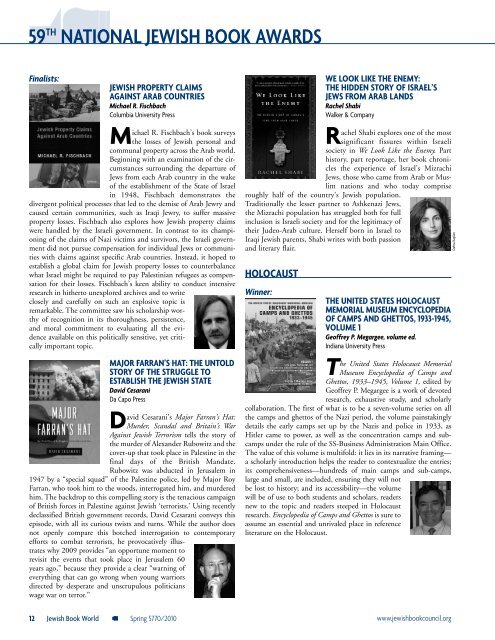reviews - Jewish Book Council
reviews - Jewish Book Council
reviews - Jewish Book Council
Create successful ePaper yourself
Turn your PDF publications into a flip-book with our unique Google optimized e-Paper software.
59 TH NATIONAL JEWISH BOOK AWARDS<br />
Finalists:<br />
JEWISH PROPERTY CLAIMS<br />
AGAINST ARAB COUNTRIES<br />
Michael R. Fischbach<br />
Columbia University Press<br />
Michael R. Fischbach’s book surveys<br />
the losses of <strong>Jewish</strong> personal and<br />
communal property across the Arab world.<br />
Beginning with an examination of the circumstances<br />
surrounding the departure of<br />
Jews from each Arab country in the wake<br />
of the establishment of the State of Israel<br />
in 1948, Fischbach demonstrates the<br />
divergent political processes that led to the demise of Arab Jewry and<br />
caused certain communities, such as Iraqi Jewry, to suffer massive<br />
property losses. Fischbach also explores how <strong>Jewish</strong> property claims<br />
were handled by the Israeli government. In contrast to its championing<br />
of the claims of Nazi victims and survivors, the Israeli government<br />
did not pursue compensation for individual Jews or communities<br />
with claims against specific Arab countries. Instead, it hoped to<br />
establish a global claim for <strong>Jewish</strong> property losses to counterbalance<br />
what Israel might be required to pay Palestinian refugees as compensation<br />
for their losses. Fischbach’s keen ability to conduct intensive<br />
research in hitherto unexplored archives and to write<br />
closely and carefully on such an explosive topic is<br />
remarkable. The committee saw his scholarship worthy<br />
of recognition in its thoroughness, persistence,<br />
and moral commitment to evaluating all the evidence<br />
available on this politically sensitive, yet critically<br />
important topic.<br />
MAJOR FARRAN’S HAT: THE UNTOLD<br />
STORY OF THE STRUGGLE TO<br />
ESTABLISH THE JEWISH STATE<br />
David Cesarani<br />
Da Capo Press<br />
David Cesarani’s Major Farran’s Hat:<br />
Murder, Scandal and Britain’s War<br />
Against <strong>Jewish</strong> Terrorism tells the story of<br />
the murder of Alexander Rubowitz and the<br />
cover-up that took place in Palestine in the<br />
final days of the British Mandate.<br />
Rubowitz was abducted in Jerusalem in<br />
1947 by a “special squad” of the Palestine police, led by Major Roy<br />
Farran, who took him to the woods, interrogated him, and murdered<br />
him. The backdrop to this compelling story is the tenacious campaign<br />
of British forces in Palestine against <strong>Jewish</strong> ‘terrorists.’ Using recently<br />
declassified British government records, David Cesarani conveys this<br />
episode, with all its curious twists and turns. While the author does<br />
not openly compare this botched interrogation to contemporary<br />
efforts to combat terrorists, he provocatively illustrates<br />
why 2009 provides “an opportune moment to<br />
revisit the events that took place in Jerusalem 60<br />
years ago,” because they provide a clear “warning of<br />
everything that can go wrong when young warriors<br />
directed by desperate and unscrupulous politicians<br />
wage war on terror.”<br />
12 <strong>Jewish</strong> <strong>Book</strong> World Spring 5770/2010<br />
WE LOOK LIKE THE ENEMY:<br />
THE HIDDEN STORY OF ISRAEL’S<br />
JEWS FROM ARAB LANDS<br />
Rachel Shabi<br />
Walker & Company<br />
Rachel Shabi explores one of the most<br />
significant fissures within Israeli<br />
society in We Look Like the Enemy. Part<br />
history, part reportage, her book chronicles<br />
the experience of Israel’s Mizrachi<br />
Jews, those who came from Arab or Muslim<br />
nations and who today comprise<br />
roughly half of the country’s <strong>Jewish</strong> population.<br />
Traditionally the lesser partner to Ashkenazi Jews,<br />
the Mizrachi population has struggled both for full<br />
inclusion is Israeli society and for the legitimacy of<br />
their Judeo-Arab culture. Herself born in Israel to<br />
Iraqi <strong>Jewish</strong> parents, Shabi writes with both passion<br />
and literary flair.<br />
HOLOCAUST<br />
Winner:<br />
THE UNITED STATES HOLOCAUST<br />
MEMORIAL MUSEUM ENCYCLOPEDIA<br />
OF CAMPS AND GHETTOS, 1933-1945,<br />
VOLUME 1<br />
Geoffrey P. Megargee, volume ed.<br />
Indiana University Press<br />
The United States Holocaust Memorial<br />
Museum Encyclopedia of Camps and<br />
Ghettos, 1933–1945, Volume 1, edited by<br />
Geoffrey P. Megargee is a work of devoted<br />
research, exhaustive study, and scholarly<br />
collaboration. The first of what is to be a seven-volume series on all<br />
the camps and ghettos of the Nazi period, the volume painstakingly<br />
details the early camps set up by the Nazis and police in 1933, as<br />
Hitler came to power, as well as the concentration camps and subcamps<br />
under the rule of the SS-Business Administration Main Office.<br />
The value of this volume is multifold: it lies in its narrative framing—<br />
a scholarly introduction helps the reader to contextualize the entries;<br />
its comprehensiveness—hundreds of main camps and sub-camps,<br />
large and small, are included, ensuring they will not<br />
be lost to history; and its accessibility—the volume<br />
will be of use to both students and scholars, readers<br />
new to the topic and readers steeped in Holocaust<br />
research. Encyclopedia of Camps and Ghettos is sure to<br />
assume an essential and unrivaled place in reference<br />
literature on the Holocaust.<br />
www.jewishbookcouncil.org<br />
Dafna Kaplan


